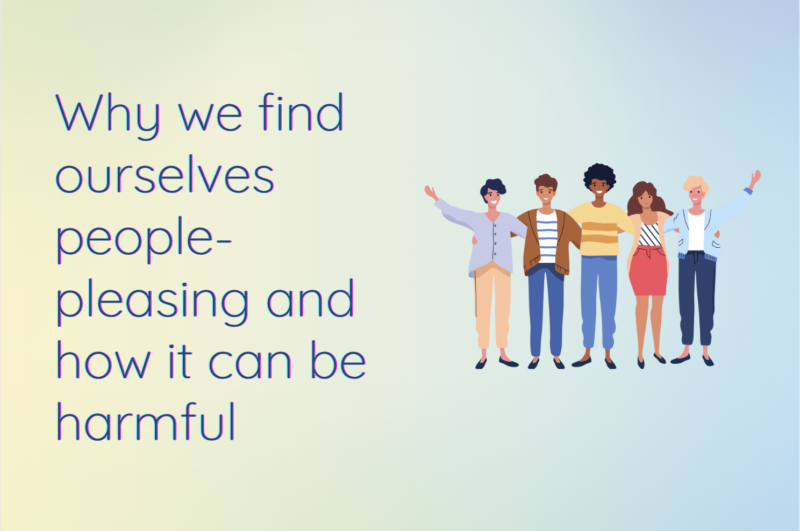Why we find ourselves people-pleasing and how it can be harmful
Roamers Therapy | October 2023

Have you ever considered yourself to be a people-pleaser? Maybe it is a label someone else has given you or you’ve taken ownership of yourself but you’re not really sure why you have consistently acted in this manner. People-pleasing can be described as doing things for others, ensuring others feel comfortable, and being overly concerned with pleasing others or getting their validation. On the surface, it isn’t inherently bad and can oftentimes be confused with kindness.
People-pleasers will often apologize a lot out of fear that they have done something wrong or not wanting to disappoint others. They will also have difficulty saying “no” because saying “yes” to everything makes them feel accepted or liked. Maybe people-pleasing is a tendency you fell into when you were a child in order to protect yourself in a difficult or traumatizing family system. Or maybe the validation you received from people-pleasing as a child felt good and became a reaffirming pattern.
There are a few ways that people-pleasing can be harmful. One way is that you can lose your autonomy and authenticity when constantly doing things for other people. When you are evaluating yourself or seeing yourself through the eyes of someone else, you are not fully exploring or accepting who you are. In fact, you may find yourself getting caught acting like those around you because you want to make sure others feel comfortable so you blend in with the crowd as opposed to simply expressing your own opinions.
It can also impact your ability to engage in productive conflict. If you are concerned with pleasing others or with what others think of you, you might be afraid to confront them with how you actually feel out of fear that it will upset them or alter the relationship. However, engaging in conflict and being able to express your feelings can be a powerful relational tool. If you continue to be agreeable and avoid conflict, you might grow resentment in your relationships.
Another way that people-pleasing can be harmful is that it can reduce or eliminate the boundaries in your relationships. You struggle to say “no” and therefore you create a dynamic within your relationship that may be energy-draining and unbalanced. You are doing all the giving and focusing on someone else’s needs or wants before your own. This may also lead to a codependent dynamic in your relationship in which you lose your individuality and contribute to unnecessary power differentials.
If you find yourself identifying with any of these traits, you may be a people-pleaser. Even though it may feel good to please others, you are likely doing yourself a disservice in not being your truest self. It is admirable to be kind and generous but doing so for the wrong reasons might actually negatively impact your mental health and wellbeing.
At Roamers Therapy, our psychotherapists are here to support you through anxiety, depression, trauma and relationship issues, race-ethnicity issues, LGBTQIA+ issues, ADHD, Autism, or any challenges you encounter. Our psychotherapists are trained in Cognitive Behavioral Therapy, Dialectical Behavioral Therapy, Psychodynamic Therapy, Acceptance, and Commitment Therapy, Person-Centered Therapy, and Gottman Therapy.
Whether you’re seeking guidance on a specific issue or need help navigating difficult emotions, we’re ready to assist you every step of the way.
Contact us today to learn more about our services and schedule a session with our mental health professionals to begin your healing journey. To get started with therapy, visit our booking page.
First, decide if you’ll be paying out-of-pocket or using insurance. If you’re a self-pay client, you can book directly through the “Book Now” page or fill out the “Self-Pay/Out-of-network Inquiry Form.” If you’re using insurance, fill out the “Insurance Verification Form” to receive details about your costs and availability. Please let us know your preferred therapist. If your preferred therapist isn’t available, you can join the waitlist by emailing us. Once your appointment is confirmed, you’ll receive intake documents to complete before your first session.
This page is also part of the Roamers Therapy Glossary; a collection of mental-health related definitions that are written by our therapists.
While our offices are currently located at the South Loop neighborhood of Downtown Chicago, Illinois, we also welcome and serve clients for online therapy from anywhere in Illinois and Washington, D.C. Clients from the Chicagoland area may choose in-office or online therapy and usually commute from surrounding areas such as River North, West Loop, Gold Coast, Old Town, Lincoln Park, Lake View, Rogers Park, Logan Square, Pilsen, Bridgeport, Little Village, Bronzeville, South Shore, Hyde Park, Back of the Yards, Wicker Park, Bucktown and many more. You can visit our contact page to access detailed information on our office location.
